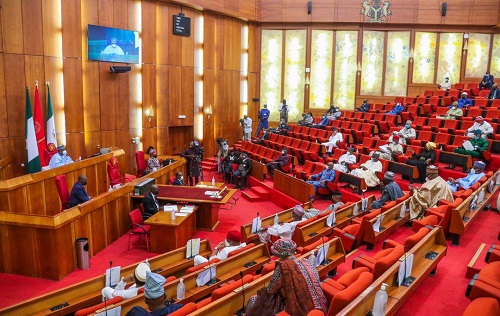- Insist such crops unsustainable, unsafe
By EDU ABADE, Business Editor
A coalition of environmental activists, public health and food safety advocates has commended the Senate for backing strict regulation of Genetically Modified Organisms (GMO) crops in the country.
The groups comprise the Health of Mother Earth Foundation (HOMEF), Corporate Accountability and Public Participation Africa (CAPPA), Environmental Rights Action/Friends of the Earth Nigeria (ERA/FoEN) and GMO-Free Nigeria, among others. They applauded the Senate for considering a bill to review the National Biosafety Management Agency (NBMA) Act in the overall interest of protecting food safety and public interests in Nigeria.
They were reacting to a report titled: Senate Insists On GMOs Thorough Regulations, insisting that they reject and will continue to reject GMO crops and being fed with contaminated foods.
Speaking, Director of HOMEF, Nnimmo Bassey, said: “This is a huge milestone towards defending the rights of Nigerian citizens to safe food and environment. It is a step in the right direction for consumers and especially for small holder farmers who are directly impacted by GMOs and associated chemicals, and yet have little or no knowledge or choice about the entry of these unnatural varieties into our food system or of their potential risks, The Trumpet gathered.
“We reject being fed with foods of dubious quality! We have always called on the Federal Government to interrogate the questionable authorisation of crops that would have irreversible impacts on our biodiversity, health, environment and food safety. We applaud Senate’s intervention in seeking to enforce law and order with proper regulation of Biosafety in Nigeria.”
Bassey added that promoting food safety and security/sovereignty is a mandate that rests not just on the Biosafety Management Agency, but also on the entire public and as such public opinion must be considered in decision making processes concerning GMOs.
Read Also: Terrorists continue attacks in Kaduna, threaten to kill 900, demand N30million
The report indicated that Presenter of the bill and Senate Leader, Dr. Yahaya Abdullahi, stressed why the Bill for the Amendment of the National Biosafety Management Act (NBMA) must be supported for more diligent legislation that would make our country zero tolerant to any hazardous product as related to GMOs saying our soils and the good health of Nigerians must be well protected with eco-friendly environment.
He said: “There have not been any conclusive findings regarding overall safety of GMOs on human lives and the environment. So Mr. President, my colleagues, caution must be our watchwords in the handling of the GMOs, because as we speak, about 60 countries around the world n have partially or totally rejected and banned the use of GMOs.”
In his response, Director of CAPPA, Akinbode Oluwafemi, who commended the Senate for what he described as ‘a bold step’ said: “We strongly believe that scientific integrity and social responsibility and accountability are not negotiable and no technology should be exempted from these values.”
He added that those saddled with the responsibility of protecting the nation’s food must not ignore the industrial yield-output paradigm and adopt a more integrated systems approach to food and agriculture that would take into consideration many factors, including local food security and sovereignty.
Executive Director of ERA/FoEN, Chima Williams, said this was a welcome development and that the Senate position resonated with what activists have being telling Nigerians and the Federal Government for over a decade.
“GMOs are regulated because their safety is not guaranteed. There are good reasons why robust regulatory mechanisms are in place for GM food and GM crops in Europe. GMOS are not the same as natural varieties and they are also not substantially equivalent.
“If they were indeed one and the same thing, as the GMOs proponents claim, why are they modifying them and why have patents on them? The claim of substantial equivalence as touted by the promoters of the technology is an industry get-out tactic to avoid the rigour of proper assessment and regulation.”
On her part, Coordinator for Food Sovereignty Program for Friends of the Earth Nigeria and Africa and the Chair of the Agroecology and Land Working Group of the Alliance for Food Sovereignty in Africa (AFSA), Mariann Bassey-Orovwuje, said: “There are enough reasons to hold back on commercialising GM Crops in Nigeria.”
She urged the Senate to subject all GMO crops and food approved in our environment to an independent, transparent, environmental, social and health impact evaluations, adding that as a matter of urgency, they should be subjected to stringent regulatory scrutiny to determine if the groups’ concerns about them were justified.
The groups vehemently reject the non-circumspect method of the National Biotechnology Development Agency, National Biosafety Management Agency and partners to foist GMO crops and foods on Nigerians through their introduction and marketing in the country’s agricultural system and food supply chain.






